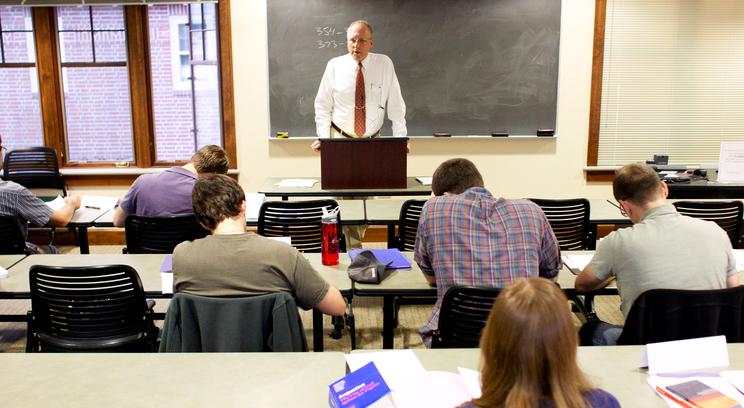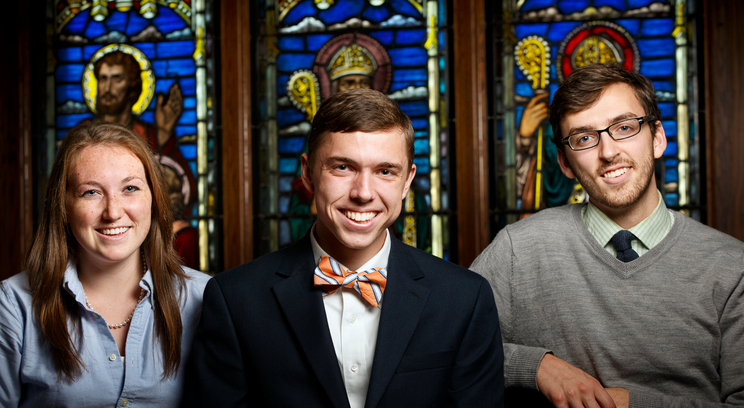Since accepting the first graduate students in 2000, the Catholic Studies’ graduate program has been filled with students with varied undergraduate degrees and professional careers. Our graduate students come from across the world. Some are admitted immediately following their undergraduate studies, some are looking for a career change, but many also return to academia with full-time jobs and families. Some are able to take courses only during the summer sessions.
What is distinctive about the Catholic Studies Master of Arts program? What prompts adult students to commit to a two-year course of study? They come, in part, because they are drawn to the unified and integrated intellectual life of the program.
They come interested in an advanced course of study that provides a comprehensive, interdisciplinary understanding of Catholicism and of the Catholic intellectual tradition. They take classes that explore the truth, beauty and vitality of Catholicism and return with new insights to and enthusiasm for their chosen professions.
Three of our graduate students reflect on what drew them to the program and how their course of study has influenced their lives. Their essays are as unique as they are.
Katherine Webb is a pre-K teacher at Ave Maria Academy and at St. Thomas the Apostle in Corcoran. She received a B.S. in elementary education from Western Kentucky University in Bowling Green, Ky., in 2004.
Philip (P.J.) Butler is a valuation analyst in commercial real estate appraisal at the Shenehon Company. He received a B.S. in finance from the University of Illinois − Champaign/Urbana in 2007.
Shannon Nowak is a new mother who also holds a full-time position as a graphic designer at St. Thomas. She earned a B.A. in graphic design from St. Thomas in 2009.
P.J. Butler
Six years ago, I did not anticipate being surrounded by the bustle of downtown Minneapolis every weekday, but I am grateful to be here on Nicollet Mall, working alongside my colleagues.
I earned my Bachelor of Science in finance from the College of Business at the University of Illinois in 2007. I entered the program without an awareness of what I wanted in life and with no method to discover my vocation. I was discouraged by the apparent vanity of learning for tests and contrived employer-networking fairs. I understood financial markets and accounting practices, but I did not grasp the purpose of work; thus, I wanted nothing to do with the business world upon graduation. After working in campus ministry and religious education, I recognized a great need and desire to return to school in order to attain more clarity about my place in our culture. I was not interested in theology as such, or philosophy, or biblical evangelization. I needed something broader and more universal, interdisciplinary. I found my home when I encountered the Catholic Studies’ master’s program at St. Thomas.
What I discovered at Catholic Studies was a reasonable proposal of education and culture that was broad and integrated and coherent. I encountered the explanatory power of the Christian narrative. I encountered an education that is not a mere steppingstone for a career. The education students receive is good in and of itself. Notwithstanding the excellence of the College of Business at Illinois, I recognized the narrowness of the specialized financial training I received there. I discovered what I always intuited, that I am not a mere cog in a vast economic machine or an anonymous worker in an impersonal work-a-day world. Man’s dignity does not come from the work he does but from the person he is.
“And thus,” according to John Henry Newman, “without directly qualifying a man for any of the employments of life, [an education like that of Catholic Studies] enriches and ennobles all. Without teaching him the peculiar business of any one office or calling, it enables him to act his part in each of them with better grace and more elevated carriage.”
The Catholic Studies program has given me a new freedom in front of the necessity of work, since it has educated me to expect and look for the relationship of all things, especially work, with the historical and cultural fact of Christ.
And so, last year, thanks to the education of Catholic Studies and the gift of Christian friendship I was able to take the risk and enter the world of secular work, which is a significant change from 2007. This is only possible because my education, which has contributed to my certainty in who I am, and where I am in the context of 21st century, post-Christian America. This is the education one receives in a Christian culture. This is the education one receives in Catholic Studies.
Shannon Nowak
I recently went to a friend’s a wedding, a common weekend sacramental celebration for a young Catholic 20-something. The Master of Arts in Catholic Studies program has given me, among other things, greater intellect and vocabulary to understand what this sacrament of marriage truly means for Catholics today. Beyond the bowties, butler-passed hors d’oeuvres and blue Mason jar centerpieces, marriage is a sacrament and an opportunity to be a witness of faith. This covenant between a man and a woman is the beginning of a family, the most basic cell of society and a strong example of a blessing through which men and women receive grace, particularly the grace to endure. The CSMA program has brought to light how essential the acknowledgement and acceptance of these graces are.
I’m preparing now for the baptism of our first son. What another wonderful sacrament, another incredible opportunity to be a witness for Christ, and another common weekend celebration for those young Catholic 20-somethings. Beyond the diapers, baby monitors and visits from the ecstatic parents who have recently become grandparents, we recognize what this sacrament truly means. We are called to be examples of faith, to pass on our tradition to a new generation. One of the main reasons I joined the CSMA program was so that I could more fully understand the faith and more confidently share it with my new family. I want to be able to answer questions such as, “Who is Jesus?” and know how to properly respond when I find my son baptizing a carrot (which has not happened yet, but a friend warned me, from experience with her own children, that it might).
I’ve just returned to work after maternity leave, and the late-night feedings have given me plenty of personal time to reflect on the way work, too, is an opportunity to be a witness to the faith. I don’t think the line was, “go forth and make graphic designers of thee,” but it is as a graphic designer, working here at St. Thomas, that God has called me specifically to be a witness. As I’ve learned more deeply from the CSMA program, the dignity of the human person depends at least in one respect on the ability to do work, to contribute meaningfully to society and to be able to provide for one’s family. Without fully understanding my own value as a human person, I would not be able to work to my potential. What kind of worker would I be if I didn’t realize that I was working for Christ? Catholics who truly long to understand their faith, to understand the tradition in a more complete way, are needed in society. They are needed as husbands and wives, as parents and as men and women in the work force.
The CSMA program has challenged me intellectually, nurtured my spiritual growth and energized me to be a witness to the faith, a soldier for Christ in every area of my life. Each night after class I return home to give my husband a summary of the lectures and discussions from the Sitzmann Hall classroom. I find ways to bring Thomas More and Cardinal Wolsey up in conversation at work (which is not always easy when your job more commonly includes discussions of fonts, layouts and color palettes). I don’t know if I’m converting souls or drastically changing the world, but I am spreading the light of Christ at least in some small way through the different aspects of my life. I know my classmates feel the same energy, and that they leave class, or CSMA community dinners, or Mass in the Albertus Magnus chapel, charged with enthusiasm for the faith and ready to tell the world about it. What is the Catholic faith if it isn’t enthusiastic Catholics sharing that faith wherever they go?
Katherine Webb
Having started my first semester as a graduate student at the University of St. Thomas pursuing a master’s in Catholic Studies, I find my experience incredibly relevant, energizing and enriching to my own faith life.
I am a teacher at Ave Maria Academy, a small Catholic school in Maple Grove, Minn. The school where I teach has a mission of helping students to become saints through a curriculum that is focused on academics and virtue formation. I have been blessed to work at the school for two years and have encountered several individuals who have gone through the master’s program at St. Thomas. Through various conversations and reflection, I have decided to pursue my own master’s in this program. While I’ve always had an interest in pursuing a master’s degree, I typically thought it would be in education. It is a practical degree that would translate to a bump in pay and an enrichment in my professional life as a teacher. But I want something more. I want something that will help me in my walk with the Lord, deepen my love for the church, and help me to form a more Catholic perspective. I want to know about the church in order to impart this knowledge to the students I teach, the parents with whom I will visit and the people I encounter on a daily basis.
Having taken my first course in Catholic Studies, I am finding that throughout history, the church has been incredibly relevant. My first course was “Catholic Thought and Culture II.” In each class period, despite being tired all day from teaching, I found tremendous substance for my mind to feast upon. The truth is inexhaustible, and the professor gave a perspective that showed how the church that once played a major role in civilization has now been lost, which has resulted in a culture that has lost sight of God.
The absolute truth has been lost to relativism. Instead of marveling at God and his creation, through various periods in history, man has created his own truth. The Catholic Studies program takes a countercultural approach, and in doing establishes a solid foundation from which to teach what it means to be a well-formed Catholic. I have the unique opportunity to impart this knowledge to my students as well as their parents each day and be uniquely formed in my own relationship with Christ and his church.
Historically, life centered on the church. Now life centers on man’s personal truth and the church is relegated to something that is very personal and private. Beliefs aren’t expressed at the risk of offending another’s truth. I am fortunate to teach in a school that sees value in the church, sees worth in offering opportunities to their teachers to be formed in truth and imparts a love for Christ and his church onto their students. I look forward to the various other courses that are offered in this program. I also look forward to the ways that I will be more uniquely formed in Catholic truth.
Read more from Perspectives magazine.







